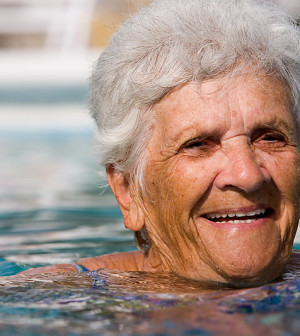- 10 Strategies to Overcome Insomnia
- Could Artificial Sweeteners Be Aging the Brain Faster?
- Techniques for Soothing Your Nervous System
- Does the Water in Your House Smell Funny? Here’s Why
- Can a Daily Dose of Apple Cider Vinegar Actually Aid Weight Loss?
- 6 Health Beverages That Can Actually Spike Your Blood Sugar
- Treatment Options for Social Anxiety Disorder
- Understanding the Connection Between Anxiety and Depression
- How Daily Prunes Can Influence Cholesterol and Inflammation
- When to Take B12 for Better Absorption and Energy
Brain Gains for Older Adults Who Start Exercising

Beginning an exercise program may help protect older adults’ brains or even reverse early mental decline, a small study suggests.
Researchers placed 34 inactive people, aged 61 to 88, on an exercise regimen. It included moderate-intensity walking on a treadmill four times a week for 12 weeks.
On average, heart/lung health improved about 8 percent over that time, the researchers found.
Brain scans also showed an increase in the thickness of the participants’ cortex, the outer layer of the brain that typically shrinks with Alzheimer’s disease. Those with the greatest improvements in physical fitness had the most growth in the cortex, the University of Maryland researchers found.
The thickening of the cortex occurred in both healthy people and those with mild cognitive impairment (MCI), an early stage of Alzheimer’s disease, the study showed.
The study was published recently in the Journal of the International Neuropsychological Society.
“Exercise may help to reverse neurodegeneration and the trend of brain shrinkage that we see in those with MCI and Alzheimer’s,” senior study author Dr. J. Carson Smith, an associate professor of kinesiology, said in a university news release.
“Many people think it is too late to intervene with exercise once a person shows symptoms of memory loss, but our data suggest that exercise may have a benefit in this early stage of cognitive decline,” Smith added.
The study can’t prove definitively that exercise led to the brain gains. However, previous studies have found that exercise can benefit other areas of older adults’ brains.
The authors of the new study said further research is needed to determine if moderate physical activity can delay or reverse mental decline and help people remain independent as they age.
More information
The U.S. National Institute on Aging discusses healthy brain aging.
Source: HealthDay
Copyright © 2026 HealthDay. All rights reserved.










